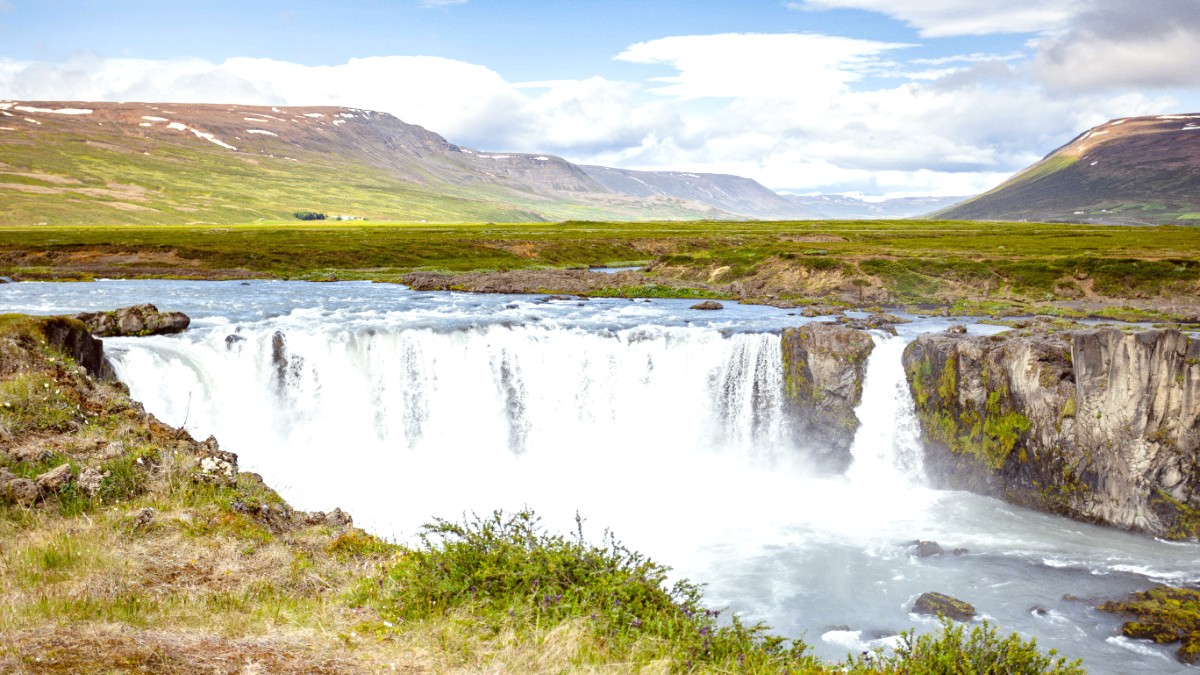
The North, Iceland
Summer (June - August): Temperatures typically range from 50-60°F (10-15°C). Nearly 24 hours of daylight occur in June. Precipitation is usually lowest, and humidity remains moderate. Days are long and weather generally stable for outdoor pursuits.
Autumn (September - October): Temperatures cool, averaging 35-45°F (2-7°C). Daylight hours shorten noticeably. Precipitation increases, with higher chances of strong winds. Autumn brings the initial good opportunities for Aurora Borealis sightings.
Winter (November - March): Coldest temperatures, averaging 20-35°F (-6 to 2°C). Daylight hours are shortest, with only a few hours of twilight in December. Snowfall is common, affecting travel. Optimal Aurora Borealis viewing occurs due to long, dark nights.
Spring (April - May): Temperatures begin to rise, averaging 30-45°F (-1 to 7°C). Daylight increases significantly, but weather remains variable. Expect a mix of sun, rain, and occasional late-season snow. Migratory birds begin to return.
Icelandic weather shifts rapidly. Strong winds are common year-round and can make even moderate temperatures feel colder. Winter brings heavy snowfall and blizzards, which can lead to road closures. Temperatures rarely reach extreme highs or lows, staying consistently cool to cold.
Regularly check the Icelandic Met Office website (vedur.is) and the road conditions website (road.is) for current information.
Be prepared for sudden changes.
Official Icelandic Met Office forecasts.
Current road conditions and closures.
Dress in adaptable layers.
Base, mid, and outer layers insulate well.
It retains moisture and cools the body.
Match your visit to your interests.
June to September for best conditions.
May to mid-August for nesting birds.
Iceland is part of the Schengen Area, which impacts entry procedures for many nationalities. Non-EU/EEA/Schengen citizens typically need a Schengen Visa for stays up to 90 days within any 180-day period. Apply for this visa at the embassy or consulate of your main Schengen destination. If Iceland is your only Schengen destination or your first point of entry, apply through the Icelandic embassy or consulate in your home country. Begin this process well in advance.
Citizens of many countries, including the United States, Canada, Australia, New Zealand, and numerous South American and Asian countries, do not require a visa for stays up to 90 days within the Schengen Area for tourism. While no visa is needed, these travelers still adhere to specific entry requirements.
Valid for 3+ months beyond departure, issued within 10 years, two blank pages.
Proof of valid Schengen Visa (if applicable).
Proof of onward or return ticket may be requested.
Demonstrate sufficient money for your stay.
Travel insurance is highly recommended. World Nomads, SafetyWing, Insubuy are options.
Iceland has a high cost of living and travel.
The official currency is the Icelandic Króna (ISK). Iceland is largely cashless; credit and debit cards (Visa, MasterCard) are widely accepted everywhere, even in remote areas. Contactless payment is common. ATMs are readily available in towns. Currency exchange services exist but are rarely needed due to widespread card acceptance.
Daily expenses vary based on travel style. Prices reflect approximate costs and can fluctuate with season and demand.
Entry prices for popular activities. Booking in advance for high season trips secures better prices.
Iceland holds one of the lowest crime rates globally. Staying informed about health and safety protocols remains wise for any traveler.
No specific vaccinations for entry. Keep routine ones current.
Hypothermia/frostbite (layer up), sunburn (use Sunscreen), dehydration (drink water), falls (good footwear), midges (repellent near Mývatn).
Tap water is excellent and safe to drink everywhere. No need for Bottled water. Food hygiene standards are high.
Akureyri has a regional hospital, Sjúkrahúsið á Akureyri. Pharmacies are also available.
EU/EEA citizens should carry their European Health Insurance Card (EHIC) for reduced-cost or free state-provided healthcare. Non-EU/EEA citizens face full medical costs; travel insurance is highly recommended.
A Reusable water bottle is handy.
Emergency number for Police, Fire, Ambulance: 112 (nationwide). For general medical advice (non-emergency), call 1700. Search and Rescue (ICE-SAR) via 112.
A policy with medical emergencies, evacuation, trip cancellation, and lost luggage. Compare World Nomads or SafetyWing. Insubuy also has options.
Consider a policy that covers activities like hiking or skiing.
AirHelp can assist with delayed or canceled flights.
Akureyri boasts a very low crime rate; violent crime is rare. No specific neighborhoods are unsafe. General caution always applies. Natural disaster risks are mainly weather-related.
If your passport is lost or stolen, report it immediately to local police (call 112, or visit Akureyri station) then contact your embassy for replacement. Most embassies are in Reykjavík.
Dial 112 (nationwide).
Call 1700 (non-emergency hours).
Also reached via 112.